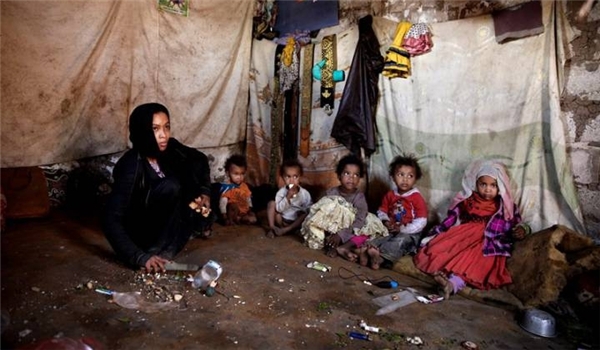
RNA - The UN humanitarian agency says the risk of mass deaths from starvation is growing among people in the conflict. Due to the drought, severe funding shortfall, aerial bombing, naval blockade, displacement, and severe food shortages, “an avoidable humanitarian crisis is fast becoming an inevitability.”
New figures released by the UNIVEF indicate that 17 million people are facing severe food insecurity and will fall prey to famine without urgent humanitarian assistance. A total of 6.8 million people are deemed to be in a state of emergency, one step from famine on the five-point integrated food security phase classification, the standard international measure, with a further 10.2 million in crisis. The numbers reflect a 21% increase in hunger levels in the Arab world’s poorest state since March 2015. As a consequence, Yemen is currently faced with one of the largest humanitarian crises in the world.
Let’s face it, the Saudis’ closest allies in this horrible affair are Britain and the United States. They are complicit in Saudi war crimes in Yemen. They supported Riyadh when it declared war in March 2015. In the face of a mountain of evidence that crimes have been committed, the United States and Britain repeatedly insisted that the Saudis have not breached International Humanitarian Law.
They have advisers in the heart of the Saudi command center which sets targets for the bombers. They provide Saudi Arabia with crucial diplomatic cover, for instance blocking Dutch calls for a very badly needed independent inquiry into war crimes by all sides. Throughout the war they have supplied arms to the Saudis. This is certainly illegal. The Arms Trade Treaty, enthusiastically supported by Britain, insists that no arms should be sold when there is an overriding risk that they will be used in breach of International Humanitarian Law. There is no question that the provision applies in the case of Yemen. Over 13,000 have been killed by the Saudi bombing, most of them civilians, while millions have been made homeless, and even more now live on the edge of starvation.
Many of the people in the conflict zones and rural areas have also lost their possessions including seeds and tools, and their animals have been killed by Saudi-led armed groups and US, UK-backed airstrikes. The internally displaced farmers don’t have their animals and their jobs back, and they remain in the refugee camps. The country is approaching a critical time in the agricultural calendar, with the main planting season beginning in May. Worse still, there is a huge shortfall in international assistance to meet the emergency needs. Because of the naval blockade and ruined ports, it is virtually impossible to send any humanitarian assistance to the war-torn country.
The UN aid agencies are also warning that the illegal war, insecurity, lack of access to aid, and the collapsing economy have left millions of children facing starvation. Malnutrition certainly plays its part as well; war and famine victims, especially children, are compromised by a lack of nutrients and medical assistance. They arrive in the refugee camps from devastated areas of the interior with their immune systems already shot. But in the end it is poor hygiene that have tugged many down. They die either from the Saudi bombing or the hunger.
Taken together, this conflict cannot be solved with arms. This is a war against illegal sanctions and blockade as well. Lifting the Western-backed economic sanctions and blockade is the only way to avoid further escalation of the serious humanitarian crisis. After three years of violence and mass murder, this worsening humanitarian crisis can no longer be left unattended.
This must be avoided at all costs. It is now urgent that the Saudi-led, US-backed war on Yemen be addressed at the United Nations. Because of their regional designs, the regime changers have turned life upside down for millions, intentionally blocking emergency food. Their relentless aerial bombings and blockade have mutilated the economy, sending food prices spiraling and pushing hundreds of thousands of children to the brink of starvation. It’s the point of no return, unless something is done immediately.
One powerful lesson from the last famines in places like Iraq, Sudan, the Horn of Africa, and Nigeria is that famines are not simply about food and water. They are about something even more elemental: war. The world needs to take action now and there is no doubt that the affected people of Yemen need food and water, but an emergency approach doesn’t tackle the roots. It is the forgotten war imposed by the United States, Saudi Arabia and their allies that has had a massive impact on millions of people.
It is time for the international civil society to see the people behind these numbers. If the war is not stopped now, we are going to be looking back on this and millions of children will have starved to death. That will shame us all as an international community for years to come.
The international civil society must understand that the real enemy of the Yemeni people are those who started this unnecessary conflict in the first place - Saudi Arabia and the United States. Efforts to avert the ongoing mass starvation need to be backed up by diplomatic action at the United Nations to force these warmongers to immediately end their illegal regime change campaign.
847/940